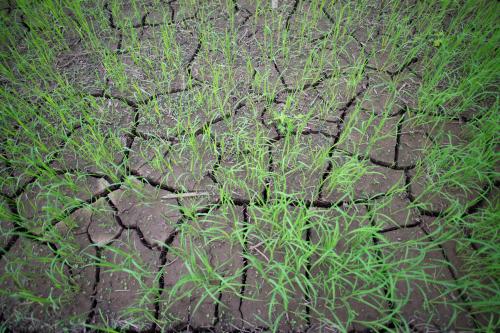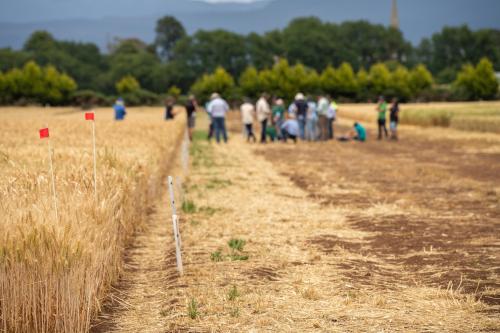This year could prove—indeed must prove, for humanity’s sake—a watershed in terms of international commitments to halt unsustainable global warming in the runup to the November 2021 Conference of the Parties (COP) in Glasgow, U.K. and beyond. The political stars seem to be in alignment now, with the Biden administration’s multilateral reengagement of the U.S., and a vaccine-driven COVID-19 recovery progressively pivoting political attention toward other global challenges. Will the fine words be matched by real climate action and additional finance on the required scale? A lot more ink will soon be spilled on this topic.
We who are acquainted with international development finance but claim no deep climate expertise initially assumed there were a small handful of well-mapped questions out there, on which true climate finance experts were hard at work seeking answers, just beyond their current grasp. Once revealed, this knowledge would need to be disseminated widely to policymakers and other stakeholders to catalyze political decisions in Glasgow and beyond and unlock massive additional resources for the defense of the planet.
We borrow Donald Rumsfeld’s notorious “known unknowns” label to refer to such staked-out, just-out-of-reach, key gaps in our global arsenal, analogous to the missing proof of effective COVID-19 vaccines, as that prospect looked barely a year ago. What then are today’s biggest known unknowns (KU) of climate finance?
To whom could one ask this question? We contacted three senior researchers affiliated with development and climate policy think tanks. We got them to pick their number one KU from four stylized one-line questions we provided, or failing any of those, invited them to frame another they felt was more important. Each then named two more experts asked to pick their own top KU, and in turn name two others they judged best-placed to do likewise, in a classic pyramid-selling cascade. We cut the expansion off after a month, having garnered 21 valid responses from 38 people approached, by when the potential list of KUs (see below) had grown to 9. The majority of the anonymous respondents are climate-focused policy researchers and advocates based in universities or think tanks, plus several from governments, intergovernmental organizations, and broader-based NGOs. They come from, as far as we can tell, a broad range of countries and professional backgrounds, operating within multiple intersecting climate-policy networks.
results
We collected 21 single-choice responses to the prompt “Which Known Unknown below do you think is most important, yet amenable to at least partial answers in 2021?”
Here are the responses, in descending order of preference:
| Response | Votes |
| Do green trajectories deliver better economic outcomes in the short term, as well as the medium to long term, than Business-as-Usual?* | 7 |
| Are deep decarbonization plans feasible for places like China that are simultaneously trying to grow rapidly?* | 3 |
| Is (any) global growth consistent with limiting (global) temperature increase to 1.5 degrees C? | 3 |
| Are there robust estimates of the impact of climate change on the incomes of poor people? | 3 |
| Instead of chasing growth, what will it take to establish resilience at the center of macroeconomic fundamentals? | 2 |
| What’s the most appropriate shadow price (range) of carbon—and does it vary by economy—post-pandemic?* | 1 |
| Is setting global emissions on track to reach net zero by mid-century politically feasible? | 1 |
| Which developing country institutions (with national/local ownership) have scalable capacity to deliver climate change finance? | 1 |
| Which developing country institutions (with national/local ownership) have scalable capacity to deliver climate change finance?* | 0 |
*= Original framing choices supplied by authors. Others as suggested by respondents.
Initial analysis
The first finding is that there is a reasonable concentration of responses. The “winner” KU, on the short-term economic outcomes of green trajectories, was chosen by a third of respondents, and together with the following three joint-equal KUs accounts for 16 of the 21 votes cast. (A note of caution: our “pyramid” survey approach did not allow early-stage voters to see questions framed in later rounds; and conversely, latecomers were offered more choices. That bias tends to over-weight the top two starred KUs, in particular, relative to others, but also note that the only question to receive zero votes was one of the initial ones.)
Second, this pattern of responses, along with voluntary write-in comments, suggests two broad strands of underlying concern. The first and arguably dominant one explores, in different ways, tensions between economic growth and the feasibility of net-zero trajectories. The second focuses more on distributional issues, especially for different country contexts and disadvantaged groups. They are two sides of the same coin: If, for example, we do not know how climate change affects the income of the poor, we cannot shape adequate compensatory policies, either at between-country or within-country levels. Nor can we neutralize the potentially regressive effects of higher carbon pricing, without which political support for green trajectories will falter in many advanced country contexts, not just low-income ones.
Third, it is definitely worth exploring further those KU, particularly the first three on this list, that lend themselves to clear-cut “yes/no” answers. That gives us an early glimpse of what state of the world is implied in either scenario, with what likely ramifications. So, for example, suppose it is revealed that green trajectories definitely do NOT deliver better economic outcomes in the short term. How then to counter this strong incentive toward business-as-usual at the household, firm, and government levels, i.e. with what mix of subsidies, taxes, and regulation, and how to generate and sustain political support for them? Likewise, if deep decarbonization plans are NOT feasible for large fast-growers like China, what can the international community realistically do about it?
Selected write-in comments
The open-ended comments and additional questions posed by our group of experts also provide insights into knowledge gaps:
- “What is the impact of decarbonization in developed countries on the trade prospects of poor countries?”
- “The questions on (China) and (technologies at scale) get to the practicality of substantive decarbonization, based on experiments and tests. By comparison, questions on (income effects, shadow prices) mainly have to do with economic estimation, which depends heavily on assumptions about models and parameters.”
- “The magnitude of vulnerability to climate change varies widely among developing countries. More research is needed to understand whether there are threshold levels of risk… that change either the whole policy approach to resilience or require different international support for the most exposed countries.”
- “The relationship between climate and COVID is discernible in the way most governments are failing in their response to the pandemic. Exposed are systemic weaknesses that would have otherwise taken decades to reveal. Failure in pandemic responses is largely failure in dealing with non-financial external shocks, which also might be pointing us to where we need to go, especially since the world will not, and cannot, go back to the world of pre-Feb 2020.”
What next?
We all feel a sense of urgency to do something, but what? Inclusive, de-carbonized growth is the answer, yet the technical and financial pathways of how to get there are unknown. Our modest effort suggests that there are several big “known unknowns” to add to the “unknown unknowns” we also ignore at our peril, but are for now unable to identify, by definition. Asking the right questions before launching into the answers seems like a good place to start, even though time is short. Comments and suggestions from readers are welcome. In particular, would running a more rigorous survey with similar inspiration, but different participation and sampling methods, be a useful endeavor?
-
Acknowledgements and disclosures
The authors thank Marcus Manuel, Simon Maxwell, and Mark Plant for their helpful comments and advice.
The Brookings Institution is committed to quality, independence, and impact.
We are supported by a diverse array of funders. In line with our values and policies, each Brookings publication represents the sole views of its author(s).









Commentary
Climate finance: What are the ‘known unknowns’?
March 9, 2021